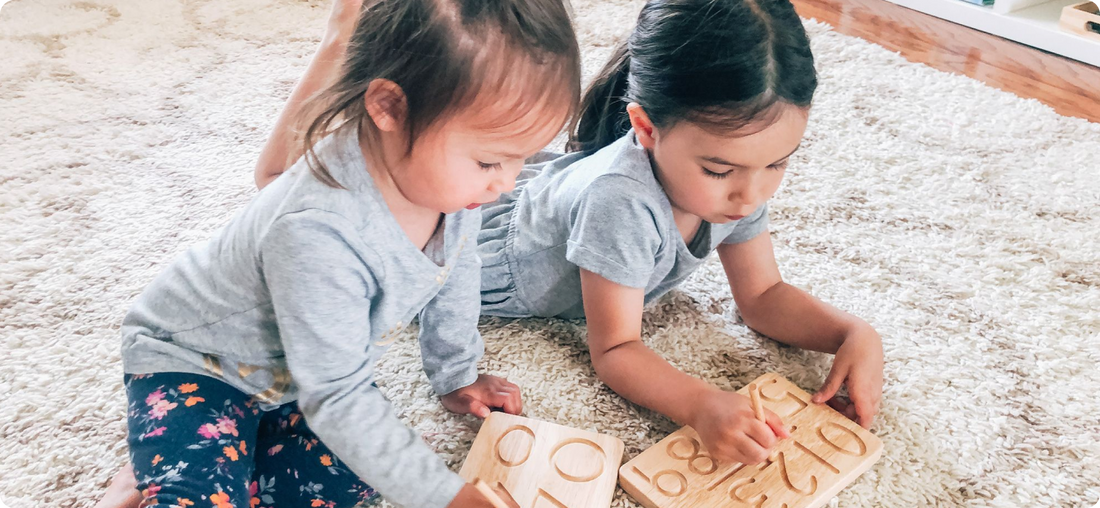There are so many decisions facing parents these days. Disposable or cloth diapers? Public or private school? The list goes on and on.
But don’t despair. Some things are fundamental. And when you’re struggling with how to help your child’s development, there’s one simple thing you can do every day: get them outside.
As Dr. Maria Montessori explained, children should have free access to outdoor play. She understood the natural learning environment was critical.
Here are 7 reasons outdoor play is important for children’s development.
1. Outdoor play teaches social skills.
Everything a child needs to know about interacting with others, they learn on the playground. Let’s be real. It’s hard to learn how to get along with others by staring at a screen or plugging into a video game. It just doesn’t work.
When children play outside with their friends at recess or with other children at the park, they learn to negotiate. Children learn to take turns on the swings. They learn to hang back for their friend that’s walking a little slower than the rest of the group. They learn the social contract of life, and they learn it most effectively without unnecessary interference from adults.
So take a seat on the bench and relish in the look of accomplishment on your child’s face when they invite a new friend to play with them.
2. Outdoor play develops children’s appreciation for the natural world.
Children are spending more time inside than ever before. And in this one-click world, having an appreciation for the natural world is critical,not just for the health of the planet but for their own health. So make sure your child has intentional time in nature each day.
Nature has restorative properties, and there’s something magical about children napping outside and walking barefoot in the grass. Just being outside changes your mood, and it does the same thing for children. It activates the senses, and that’s how children interpret the world. Let them experience the smell of fresh snowfall and feel the wetness of a spring rain.
3. Outdoor play encourages children to use their imagination.
Outside, your child's imagination runs wild. When children are outside, streams become castle moats, and mounds of dirt become mountains waiting to be conquered.
The outdoor world is limitless, which appeals to your child’s need for independence and adventure. Outside is freedom. It’s the place where kids get to actually use their outside voices. They get to do those things they’re told not to do inside. Run as fast as they want. Climb up a slide. Scream at the top of their lungs.
And when children have enough outdoor time, it actually increases their ability to focus and concentrate more deeply. Giving your child the time they need to get their wiggles out allows them to be more successful during those inevitable moments when they have to sit quietly.
4. Outdoor play promotes physical development.
It’s pretty obvious, but children are more active when they’re outside. And when children are more active, they sleep better and learn better; they do all things better.
Outdoor play improves your child’s overall health. It’s physical exercise that your child sees as play. Gyms can be challenging for many adults, because they're artificial. Making outside play part of your child’s daily routine can instill a love of movement that carries them into adulthood.
Struggling to get your child outside? Go with them. Bring their favorite books outside. Keep a blanket in your car for impromptu picnics because some children need more encouragement than others to get outdoors.
5. Outdoor play gives children their Vitamin D.
Children and adults need sunshine. It’s physiologically important. Vitamin D is something your child’s body needs. It supports their bone growth, brain and nervous system, and overall cardiovascular health.
Seasonal affective disorder is real. People are sadder without sunlight, and that includes children. Even on cloudy days, the light your child gets from being outside is far better than the light you get inside.
When children don’t get enough sunshine, their rhythms are off. And as a parent, you know your child’s rhythms and routines are critical to their feelings of stability and security.
6. Outdoor play is important year-round.
You’ve probably heard the saying, “There is no bad weather, just weather you’re not prepared for.” Too often, outside time is seen as something children have only when it’s 72 degrees and sunny. And if you live somewhere with harsh seasons, it’s certainly easier to stay inside on those less than ideal weather days,
But children need to go outside whenever it’s safe to be outside. That means bundle up when it’s snowing and throw a swimsuit on in the summer. And remember, “no” is for safety, so let your child splash in the puddles and cook you mudpies in their imaginary kitchen.
7. Outdoor play allows for safe risk-taking.
Being able to take risks is important. For children, learning to take risks in a safe and controlled environment is a very effective way to develop this skill. And outside is an ideal environment for that.
Children need to test their boundaries and not be told what their limits are. They need to experience them. Your child needs to decide how high is too high to swing. They need to decide whether or not they’re ready to climb that tree.
It’s very natural to want to protect your child from falling, but resist the urge at the park and in life. Because remember, it’s not about falling, it’s about whether or not your child gets back up.
And they will. With you by their side. 
Did you find this information helpful? If so, please check out our other blogs. At Montessori & Me, we are committed to bringing you content that enriches your family’s life.




